Rescue Work
At CHAT we provide a vital rescue service for animals in need. In the areas surrounding our two London clinics - South East and East London we carry out rescue work with stray, sick, injured or feral cats and kittens. We also respond to requests for assistance from Housing Associations, Council departments, the Police, Social Services, and other charities in situations involving the collection of pets where people have been evicted, died, hospitalised, arrested, sectioned or in other welfare situations. Our skills working with feral cats and kittens are specialised and were originally developed by Celia about 40 years ago at a time when pest control firms were the normal way to deal with feral cats which were considered vermin in those days. Our Sanctuary team are similarly busy with the task of responding to assist cats in need in East Sussex and parts of Kent.
On this page we tell you about some of the rescue cases we have undertaken, stories which illustrate the variety of situations that we are called to rescue animals from.
Abandoned cats
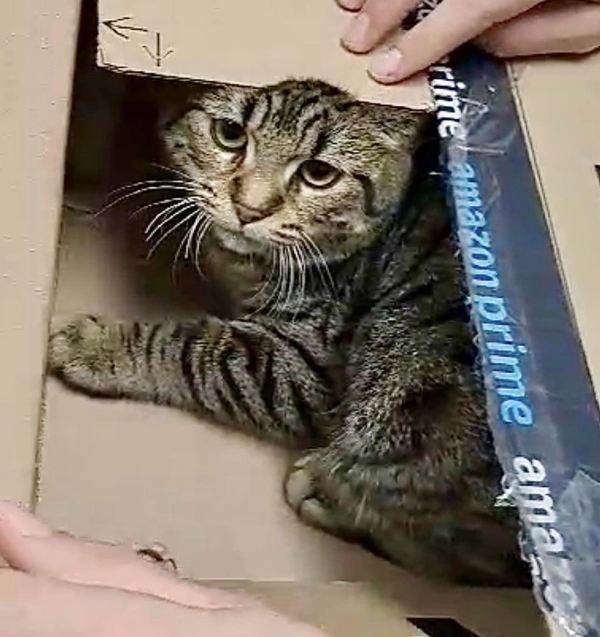 Cats being abandoned in carriers and containers outside our centres, on doorsteps, by bins, in parks and even on public transport is sadly a common occurrence. The fall out from the Covid 19 Pandemic when so many people acquired new pets and the effects of the Cost of Living Crisis and high veterinary costs have contributed to such large numbers of unwanted pets being abandoned.
Cats being abandoned in carriers and containers outside our centres, on doorsteps, by bins, in parks and even on public transport is sadly a common occurrence. The fall out from the Covid 19 Pandemic when so many people acquired new pets and the effects of the Cost of Living Crisis and high veterinary costs have contributed to such large numbers of unwanted pets being abandoned.
This story was so shocking to us, we almost didn’t want to tell you about it.
We cannot believe the creative ways people come up when dumping their unwanted cats. Just when we think we have seen it all, something else happens that leaves us speechless.
In the whirlwind of Christmas holiday preparations, so many donations come through Amazon and we are very grateful to you, our supporters, for your gifts to help the animals.
Recently, a person wearing a mask and dressed as a driver delivered an Amazon box to our Canning Town reception. Nothing seemed unusual about the delivery until we went to pick up the box and noticed there were holes in the sides. We felt a movement so we rushed to see what was inside…
Our hearts sank as we uncovered the shocking surprise – a beautiful young cat was staring up at us, scared and confused. The initial wave of rage was palpable; how could someone treat a living being as a mere package? To disguise an unwanted cat as a gift for the charity felt like a cruel joke.
Can we say again we have now seen it all? We probably shouldn’t.
Injured strays - Ginny's Story
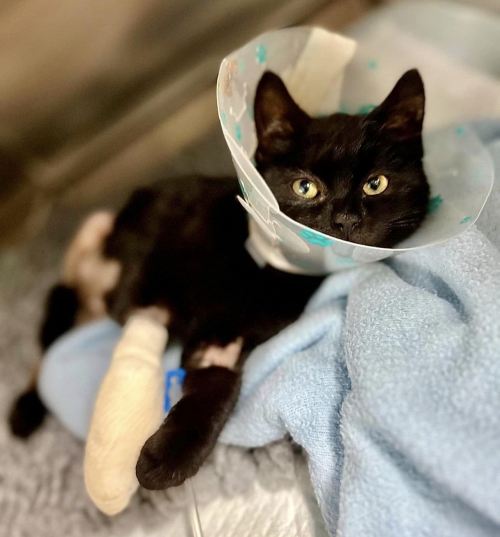 At just 8 weeks old, Ginny was found buried amongst a pile of rubbish at a commercial waste site. It is not clear how she got there, but it's suspected she arrived inside one of the large commercial bins, the contents of which had been disposed of at the location.
At just 8 weeks old, Ginny was found buried amongst a pile of rubbish at a commercial waste site. It is not clear how she got there, but it's suspected she arrived inside one of the large commercial bins, the contents of which had been disposed of at the location.
A waste management officer who was working to separate the piles of waste was horrified to discover the poor kitten. This man must have had a very keen eye as such a tiny black cat would have been very difficult to distinguish.
We don’t know how long Ginny was buried there or what level of impact she had endured, but miraculously she was still alive! Thank goodness, a member of our staff was just a few blocks away, tending to a nearby feral colony. Within moments, Ginny was retrieved from the waste site and immediately rushed to our Canning Town Centre. Our vets urgently administered medical support including pain relief, x-rays and vital medications. Ginny had suffered from a severely fractured pelvis as well as a broken leg. Our vets carried out surgery to repair her broken bones and she received 24 hour care from our dedicated Vets and nurses during her recovery.
When Ginny first came to us, she was unable to stand or walk. She was able to undergo surgery to repair her broken bones and also received 24 hour care from our dedicated vets and nurses. Ten days after surgery we were happy to report that Ginny could stand up and walk and show us her sweet personality, she was then transferred to a foster home to continue her recovery. Once in foster she began to reveal her sassy and resilient personality as she gained more strength whilst on crate rest. Understandably, her foster care-giver was helpless to her charms and could not resist but to adopt her as a permanent member of their forever family!
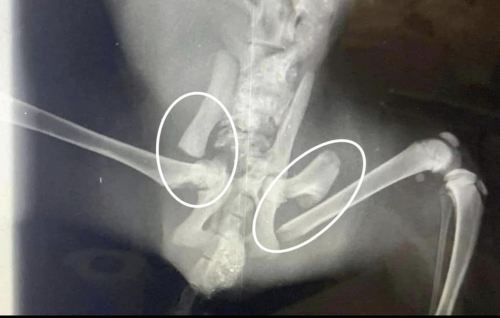
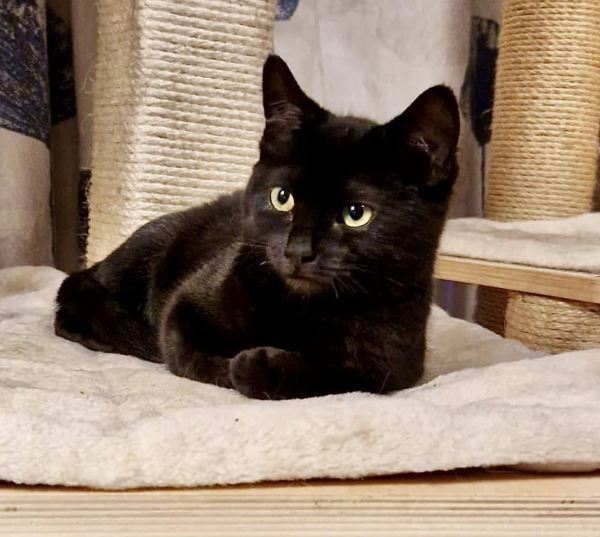
Multi-cat households
We frequently assist with situations where owners have not neutered their cats and the number of cats they have has soon grown out of control. In this case our Lewisham rescue team were called out to a friendly pregnant stray cat who had taken up residence in a garden in Stockwell South East London. There were a few other cats milling about and enquiries soon pointed in the direction of one house who we were told had around 20 cats. We went to the house and introduced ourselves to the owner who explained that she didn't know what to do as she had so many cats and was scared that the cats might be being taken away from her and be put to sleep so she hadn't sought help. She was very pleased that we were able to help her and that we could neuter the cats ASAP to prevent numbers increasing further.
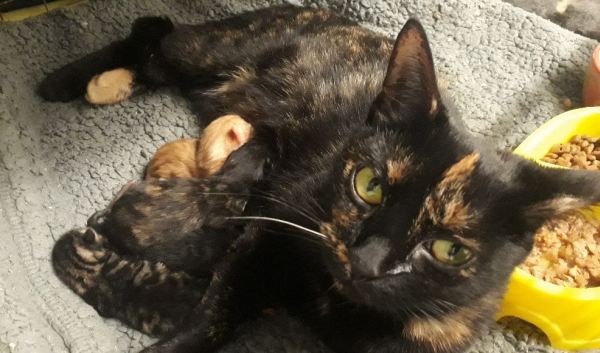
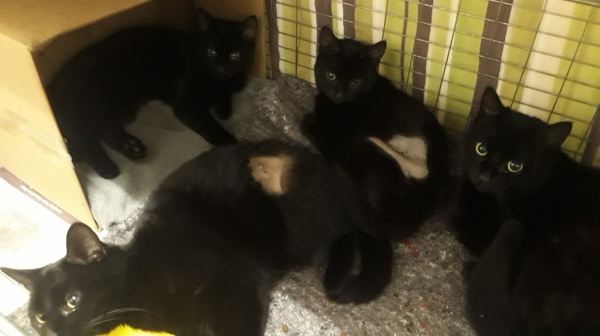
We took in the heavily pregnant cat from the garden, plus a further 24 cats, one of which was also heavily pregnant and gave birth to five kittens just hours after arriving with us. The rest of the cats were young adults 16 females and 7 males. Our vets neutered, microchipped, vaccinated and administered flea and worm treatment to all the cats. The owner ideally their owner only wants three of her cats back permanently so we have kept the rest at the centre and are trying to find new homes for them as soon as we can.
If we had not heard about this situation and been able to help promptly with neutering, this family of cats would have grown in number to around 100 cats in the next 2-3 months time as every female cat would have given birth to approx 4-6 kittens each and the situation would have become a crisis as their owner would have been completely overwhelmed and unable to meet even their basic needs.
The suffering of strays - Marty's story....
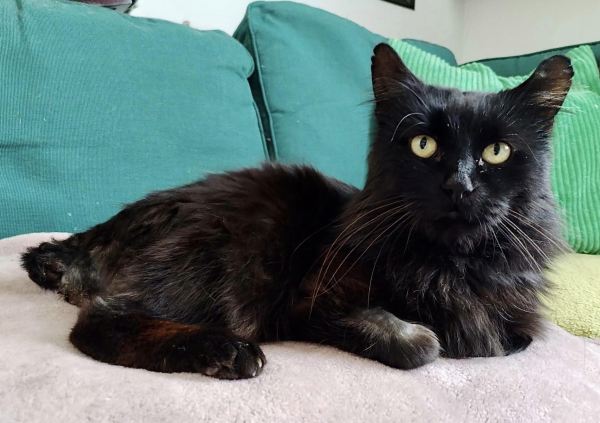
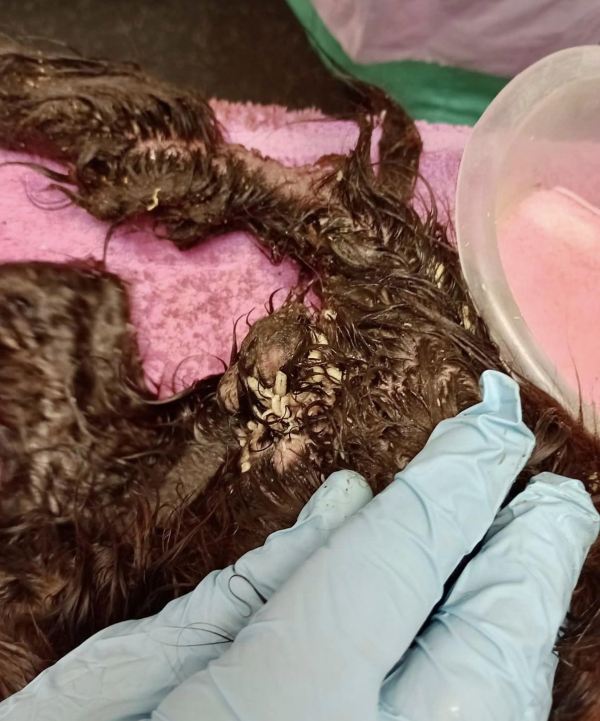
On a hot Summers evening we received a call about a collapsed cat on the street. A member of our team, Kathy, immediately set out to retrieve the cat. He was found unresponsive, presumably from dehydration, heat and exhaustion. His tail and back side were covered in flies, fly eggs and maggots.
He was rushed to our Lewisham Centre where our medical team discovered a terribly infected wound on his tail. It was quite a nasty tear alongside two puncture wounds. The lesion was infected with a deadly condition known as flystrike. Flystrike is caused by flies laying eggs on fur, or in this case inside of an open wound, which then hatch into maggots that burrow under the skin and feed on the flesh.
Flystrike is more common in warm summer months, when flies are most active and tends to develop very quickly because it only takes a few hours for fly eggs to hatch and maggots can cause extensive damage in as little as one day. Flystrike is an extremely painful condition, and can be deadly if it’s not treated quickly enough. Two members of our medical team spent hours into the night removing the flies and maggots from this boy's skin and fur. His tail was so severely damaged that it unfortunately had to be removed.
We named him Marty. Poor Marty was an unneutered male cat found without a microchip. Our vet said his wound was likely the result of a fight with another male stray and could have easily been prevented had he only been neutered. This unfortunate circumstance is a stark reminder of what can happen when cats are left unneutered.
Unneutered male cats wander from their homes, instinctually in search of female mates and often end up lost, injured or sick and needing to be rescued. The problem is not only the litters of kittens that he may be fathering but the potentially fatal fights he will get in and injuries inflicted on other cats.
Marty safely recovered in the care of our Lewisham veterinary team. His tail could not be saved and required amputatation but with round the clock care, antibiotics and pain medication he made a good recovery, he was also neutered and microchipped and has since been adopted by a member of staff.
Feral colonies - TNR (trap, neuter and return) work and rehoming
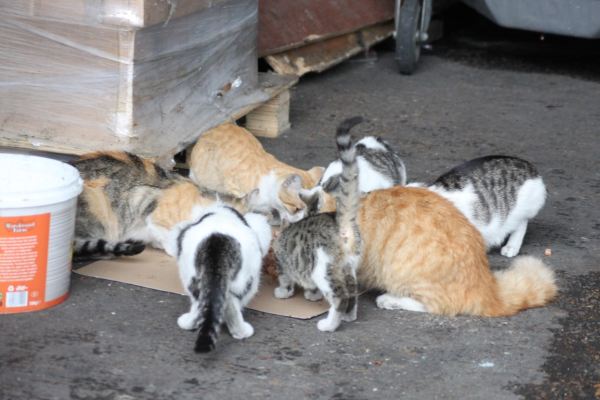
Our experienced rescue staff and volunteers are trained to humanely and effectively trap feral cats and kittens using specially designed equipment and techniques developed over many years. We have decades of experience working with stray and feral cats and kittens and because of this we are kept very busy with requests to help such cats in London and the South East as well as providing advice for people all over the U.K and sometimes abroad. A lot of our time and effort is spent working in the areas local to our shelters humanely trapping, neutering and returning (TNR) cats to locations where they will continue to be fed and have shelter. Whilst many rescue missions are more routine we are frequently called to situations where stray cats and kittens are in great danger such as on building sites, on demolition sites or waste transfer sites. Our reputation with feral cat rescue means that rescue jobs involving stray and feral cats are routinely referred to us by other organisations.
Our rescue teams routinely respond to trap, neuter and return colonies of feral cats. Feral cats that we neuter and return are "ear-tipped" - the tip of the left ear is clipped whilst they are neutered. This does not cause the cat any distress but is done so that anyone can identify at a distance that the cat is neutered. Ear tipping is a standard practice carried out by animal charities around the world. The cats are also micro chipped and registered to ourselves so that if they are ever picked up again we can locate which colony they belonged to and their feeders details.
